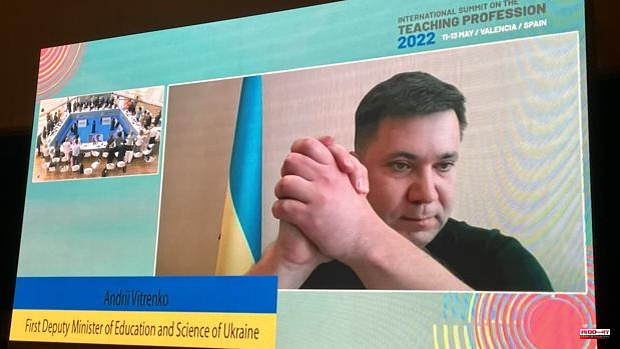The Minister of Education of Ukraine, Andrii Vitrenko, has requested this Friday resources with which to "train teachers so that they can provide psychological support to children" who are suffering from the Russian invasion of their country and with which to guarantee their learning, by while he has been grateful for the support of the international community and organizations like Unicef during the war.
The leader has participated this Friday by videoconference in the closing session of the 12th International Summit on the Teaching Profession, which has brought together representatives from 16 territories at the Palau de Les Arts in Valencia since Wednesday.
During his speech, which ended with a standing ovation from the attendees, Vitrenko lamented that "many of our schools have been bombed and closed."
However, he explained that, with the safety of children and teachers as a "main priority", many students have been able to resume classes thanks to the efforts of teachers. In this sense, he has asked for help so that the students who have had to leave their homes, as well as their teachers, can find a space in which to live with the technical needs to be able to continue teaching.
Along the same lines, the representative of the Ukrainian teachers' unions, Kateryna Maliuta-Osaulova, has stressed that teaching professionals continue to work "in very harsh conditions", while their lives are "constantly in danger". "Our teachers have even taught their classes over the phone," she exemplified.
“Because of this armed aggression, more than three thousand children have been victims of the bombings and more than 300 have been injured in the different areas attacked. It is a massive destruction of our nation », she warned, while emphasizing that education gives « hope » to Ukrainians and « must be in the front line of recovery » of the country.
Precisely, attention to Ukrainian refugees has been one of the issues to which the different territories have committed themselves at a summit that began on Wednesday with a visit to different Valencian educational centers, although the work of the discussion groups has been developed between this Thursday and Friday.
Countries like Finland, Denmark or Sweden want to influence inclusion, reinforce secondary education or the working conditions of teachers, seek a balance between digital and analog content or retain the talent of teachers by offering incentives.
Specifically, Spain has committed to "favoring the improvement of teacher training to develop the digital competence of students", also making "a reflection on its ethical and responsible use, taking into account how they can evolve".
On the other hand, the Ministry of Education will seek to "advance the equity of the system", concentrating on the youngest ages and the most vulnerable. In addition, the Spanish delegation has proposed "to reinforce the role of teachers so that the school has that transformative and supportive character that allows us to grow as a society committed to social justice, inclusion, solidarity and sustainability as central axes".
At a press conference prior to the closing session, the Secretary of State for Education, Alejandro Tiana, made a positive assessment of the meeting and pointed out that all the countries have agreed that the pandemic has brought to light the deficiencies of the system -in relation to the digital divide during confinement-, although in his opinion, it acted "quickly".
For her part, the president of the Education International union federation, Susan Hopgood, has defended the importance of having a quality public education that addresses inequalities through communities. Hopgood has also advocated giving "trust, time and support" to teachers - a crucial figure who will not be overwhelmed by the digital realm, she has said - and instilling "hope" and "optimism" in students.
In this regard, the director of Education of the OECD, Andreas Schleicher, has called for "empowering" teachers, who have to go hand in hand with governments to advance towards more educated generations. In the same way, he has stressed that "teachers are not simple users" and must also participate in the design of technological solutions that are applied in the classroom. At the same time, he has pointed out as one of the challenges for the future, teaching students to be "more responsible for their own creative process in learning."
2












